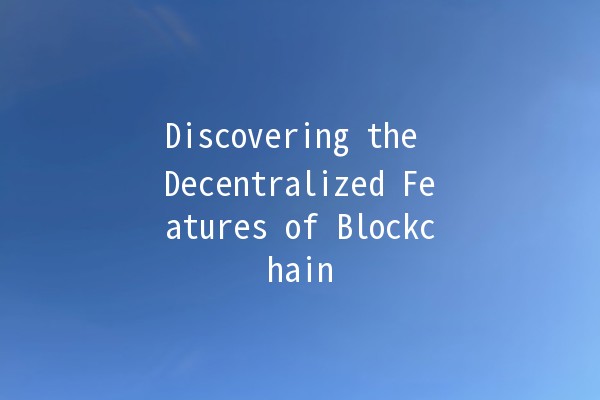
to Blockchain Decentralization
In recent years, blockchain technology has gained significant attention for its potential to revolutionize various industries. Blockchain's decentralized nature is one of its most defining characteristics. By distributing control across a network of nodes, rather than relying on a single central authority, blockchain presents unique advantages and challenges.
What is Decentralization in Blockchain?
Decentralization means no single entity owns or controls the entire system. Instead, multiple parties share authority and responsibility, leading to increased transparency, security, and resilience. This structure stands in stark contrast to traditional systems, where a central authority holds power, making it vulnerable to failures, attacks, or fraud.
Key Features of Blockchain Decentralization
Decentralization enhances the security of the blockchain. With data distributed across countless nodes, it becomes almost impossible for malicious actors to manipulate the system. Each transaction is verified and recorded on multiple nodes, making it highly resistant to fraud.
Example: Consider Bitcoin, the first and most wellknown cryptocurrency. There is no central bank or entity that can control Bitcoin, and transactions occur directly between users. This decentralized ledger means that, to alter a transaction, a hacker would need to simultaneously compromise more than half of the network—an exceedingly difficult task.

In a decentralized blockchain, every participant has access to the entire network's transaction history. This transparency fosters trust among users, as they can audit and verify the data themselves.
Example: Supply chain management can greatly benefit from blockchain transparency. Companies like Walmart are using blockchain to trace the origin of products, ensuring ethical sourcing and authenticity. Consumers can verify a product's journey from farm to table, promoting accountability.
Decentralized systems eliminate single points of failure, as there is no central server that could be compromised. If one node goes down, the network continues to function seamlessly, maintaining service availability.
Example: Social media platforms often suffer downtime during maintenance. If a decentralized social network was adopted, even if part of the system faced issues, users could still communicate and share content without interruption.
Decentralization puts power back into the hands of users. In traditional systems, users often have limited control. Blockchain allows users to manage their own data directly, reducing reliance on centralized entities.
Example: In the context of digital identity, users can control their personal information through decentralized identity systems. Platforms like Sovrin enable individuals to create and manage their identities on the blockchain, allowing them to dictate who accesses their data.
Blockchain's decentralized nature can democratize access to financial services. By removing intermediaries, people without traditional banking access can participate in the digital economy.
Example: Decentralized finance (DeFi) platforms enable individuals to borrow, lend, and trade cryptocurrencies without needing a bank account. This model has particularly impacted individuals in developing countries, who can access financial services through their smartphones.
Five Practical Tips to Leverage Blockchain's Decentralization
Description: Explore dApps that utilize blockchain for enhanced security and transparency.
Example: Use decentralized finance (DeFi) platforms for lending and borrowing without intermediaries.
Description: Utilize smart contracts to automate processes, ensuring terms are executed without the need for a middleman.
Example: Real estate transactions can be streamlined with smart contracts that automatically transfer ownership upon payment.
Description: Participate in DAOs to be part of governance decisions in a decentralized manner.
Example: Invest in projects where DAOs allow token holders to vote on funding proposals.
Description: Store data on decentralized platforms to enhance security and eliminate risks associated with centralized servers.
Example: Services like IPFS (InterPlanetary File System) offer decentralized file storage that is more resilient against data loss.
Description: Share knowledge about blockchain’s benefits and applications with your community.
Example: Host workshops or informational sessions to empower individuals to understand and engage with decentralized technologies.
Common Questions Regarding Blockchain Decentralization
What makes blockchain secure?
Blockchain’s security comes from its decentralized design, cryptographic hashing, and consensus mechanisms. Each transaction is recorded in blocks that are chained together, making alterations easily detectable.
How does decentralization affect transaction speed?
Decentralization can lead to longer transaction times, as multiple confirmations are needed from different nodes. However, advancements in technology and layertwo solutions are continually improving speed without compromising security.
Can blockchain be fully decentralized?
While the goal is full decentralization, some projects may have central components for regulatory compliance or ease of use. True decentralization is a spectrum rather than an absolute state.
Are there any downsides to decentralization?
Yes, potential downsides include slower transaction speeds and the challenge of governance. With no central authority, reaching consensus can be complex and timeconsuming.
How does blockchain handle disputes?
Most blockchain systems rely on smart contracts that define terms beforehand, reducing ambiguity in disputes. Some implementations also have mechanisms for external arbitrators to resolve conflicts when necessary.
Is blockchain technology environmentally friendly?
The environmental impact of blockchain varies widely across different implementations. ProofofWork systems, like Bitcoin, can consume significant energy, while ProofofStake systems are designed to be more energyefficient.
, the decentralized features of blockchain technology provide myriad benefits, enhancing security, transparency, and user empowerment. As more individuals and businesses recognize the importance of decentralization, the potential of blockchain to transform industries will only continue to grow. By exploring the decentralized landscape, we can better understand how to harness its capabilities for meaningful innovation and change.

